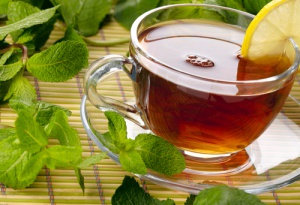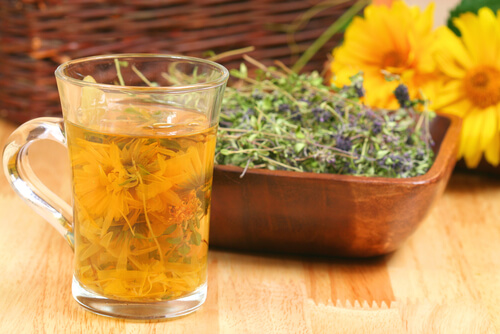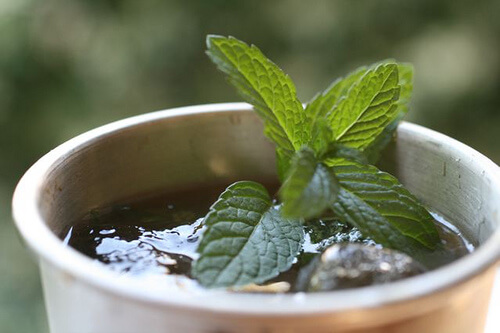Medicinal Plants to Relieve Intestinal Discomfort


Written and verified by psychologist Valeria Sabater
Your intestines are responsible for absorbing nutrients and eliminating toxic substances. This is why it’s essential to take good care of them, keeping them clean and free of toxins. So, today we’re going to tell you about some great medicinal plants to relieve intestinal discomfort.
How to know if you have intestinal problems
- It’s easy to tell. In fact, these things happen to us all the time: gas, constipation, diarrhea, or even the classic white tongue that puts a strange taste in your mouth when you have intestinal problems.
- You should also be careful about your stress levels. As you already know, your lifestyle affects your intestinal health too. Built-up tension in this part of your body can cause all kinds of changes and problems.
- We should also add that you need to regularly detox your intestines. You have to keep them well-cleaned to make sure your body’s toxicity levels stay low.
For example, the small intestine has to bring energy from food to your bloodstream. If there are a lot of toxins built up then it’s going to transmit them along with the energy, which can be dangerous. The clearest symptoms of this are having dry or wrinkly skin, skin irritation, kidney or liver pain, fatigue…Keep all of these in mind.
Medicinal plants to relieve intestinal discomfort
Gastroenteritis
Everyone has experienced this at least once. It happens when your intestinal mucus gets inflamed from infection or toxin build-up. Suddenly, pathogenic microorganisms attack your body, specifically your digestive tract. The common symptoms of this include diarrhea, vomiting, fevers, abdominal pain…
You might like:
6 Smoothies to Eliminate Toxins
What you need
The medicinal plants you’ll need are emollients, astringents, and anti-inflammatories. We highly suggest that you don’t eat any solid foods for the first few days, since the infusions will serve as an essential treatment.
1. Marshmallow plants
Marshmallow is an excellent emollient and anti-inflammatory. You can find it in natural stores. To make an infusion, you just need 1 tablespoon of this medicinal plant per cup of water. You can drink two cups a day.
2. Mint and green anise
The mixture of mint and green anise is good for soothing stomach pain, keeping you hydrated, and relieving intestinal inflammation little by little. All you need is 1 tablespoon of each plant. Boil them together in 1 cup of water. Let sit for a few minutes, strain, and drink it little by little. You can drink 3 cups a day.
3. Black tea with lemon
This is one of the most classic ways to use medicinal plants to relieve intestinal discomfort. It helps treat gastroenteritis little by little by hydrating you, fighting diarrhea, relieving pain, making you feel full, reducing inflammation…Start by making a cup of black tea. Then, put in a few drops of lemon, as long as you’re sure it won’t make you vomit.
Colitis

Colitis is an inflammation in your large intestine. It generally causes abdominal pain, diarrhea, etc… In the most serious cases, it can even lead to bleeding or pus. It’s usually the result of an attack of pathogenic microorganisms, though there are some medications with side effects that can cause it.
What you need
You’ll need medicinal plants that produce intestinal flora and help keep them balanced. Plants with anti-diarrhea, astringent, and anti-inflammatory properties are very useful for relieving intestinal discomfort and treating a bout of colitis.
Read more:
1. Eucalyptus infusion
Eucalyptus is a great plant for treating colitis. It has amazing properties that can absorb the toxins in your intestines. That’s why we suggest that you drink 2-3 cups a day of this infusion. You can find eucalyptus in herbal stores and will only need 4-5 leaves for each infusion. It’ll make you feel much better.
2. Thyme infusion
Thyme is very easy to find. It’s also a very tasty and effective as an infusion. Its properties help fight intestinal decomposition, which is why it’s so good for treating inflammation and fighting toxins and bacteria. Drink two cups a day for breakfast and before dinner. Put a teaspoon into boiling water, let sit for 5 minutes, and drink little by little.
Intestinal colic

This is the last on our list of ways you can use medicinal plants to relieve intestinal discomfort.
The main cause of intestinal colic is an obstruction in the digestive tract. This causes spasms in your intestinal muscles and can even cause inflammation or the famous irritable bowel syndrome. It’s a very annoying, painful condition.
What you need
You’ll need plants with antispasmodic properties to relax the muscles in the digestive tract and prevent the extreme mobility that always causes an obstruction. So, what are the best infusions? There’s one that’s especially effective, so pay attention:
1. Linseed, lemon balm, and chamomile
The flavor is mild but amazing. This infusion involves some of the best medicinal plants for intestinal relief, and can help with colic and improve digestion. It’s also a good anti-spasmodic, sedative, and muscle relaxer.
Linseed, lemon balm, and chamomile are all easy to find. To make it, set two cups of water to boil and then put in 1 teabag of each of these. Let sit for five minutes and drink a cup every five hours. It will calm your body and bring relieve intestinal discomfort. Don’t hesitate to try it– it’s wonderfully pleasant and healthy.
All cited sources were thoroughly reviewed by our team to ensure their quality, reliability, currency, and validity. The bibliography of this article was considered reliable and of academic or scientific accuracy.
- Fitoterapia. Noumi E., Yomi A. Medicinal plants used for intestinal diseases in Mbalmayo region, Central Province, Cameroon. (2001).
- Blog de ECOAgricultor. Agricultura y consumo ecológico. Plantas medicinales para condiciones del intestino como cólico, gases, estreñimiento, colon irritable, colitis, gastroenteritis o parásitos.
https://www.ecoagricultor.com/plantas-medicinales-remedios-caseros-intestino/
- Personal de Clínica Mayo. Cólicos. (2018).
https://www.mayoclinic.org/es-es/diseases-conditions/colic/symptoms-causes/syc-20371074
This text is provided for informational purposes only and does not replace consultation with a professional. If in doubt, consult your specialist.









